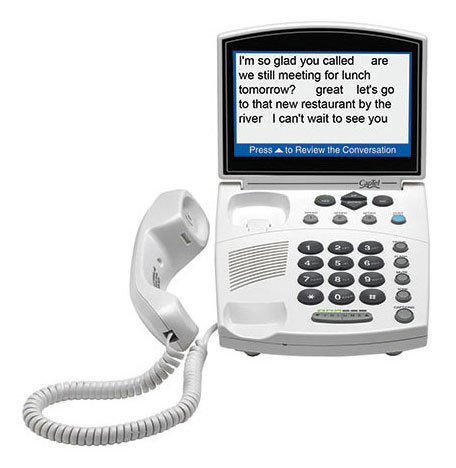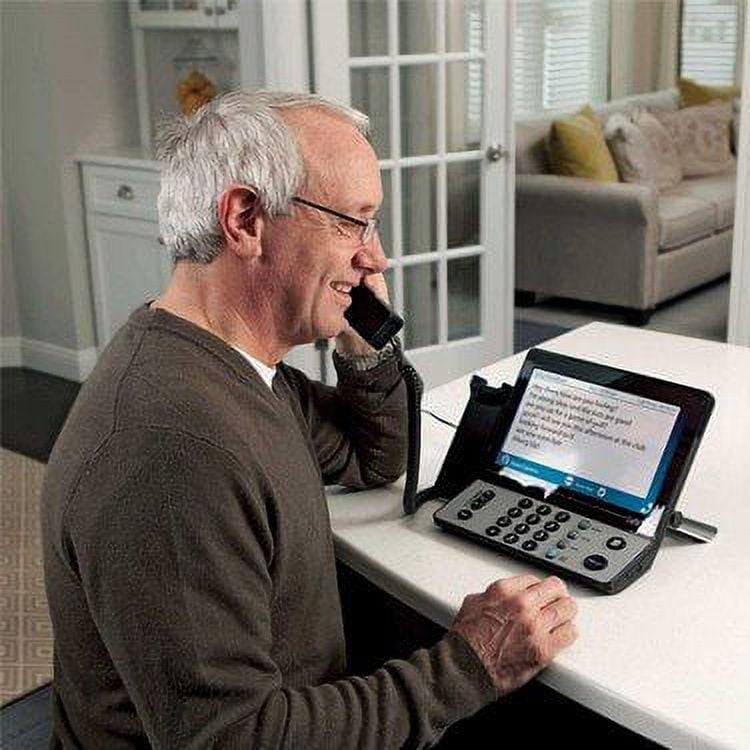Hearing Loss and Captioned Telephones – An Interview with Lynda Strelitz

Older adults and their loved ones often report that hearing loss, a common feature of aging, has a significant impact on their function and quality of life. Today we’re featuring Lynda Strelitz, Outreach Educator on behalf of CapTel Captioned Telephone. Lynda has spent over 10 years advocating for individuals with hearing impairments, and we are so grateful to her for sharing her expertise on this important issue.
Lynda, thank you so much for taking the time to sit down with me. I’d love if you could start explaining what exactly are CapTel Telephones?
Thank you for inviting me to speak with you! The CapTel®Captioned Telephone works like any other phone, except it has a large display screen and also shows captions of everything the caller says. You can listen to the caller and read captions of what they say. All CapTel phones include adjustable font sizes and colors and an answering machine that shows captions of your messages. The CapTel phone and its services are available at no cost for qualifying individuals through a fund set up by the FCC exclusively for people with hearing impairments.

How wonderful! How long have you been working with individuals with hearing loss and how did you get started in this line of work?
Ten years ago I started my job at OEI (Outreach, Education & Installations), working on behalf of CapTel Outreach. I relate because my grandfather had hearing loss, and my family and I felt we were never able to have a real conversation with him. I also have hearing loss. It not only impacts the person that has it but everyone with whom they engage in person or over the telephone.
Every day I get to bring the gift of communication to others and see the joy on their faces when they can use a phone again. I recently installed a phone at a community for a resident who hadn’t spoken to her family for over four months, since she was in the hospital and then rehab. Her family who lives out of state was so grateful.

I love that sentiment, Lynda. Tell me about your experience with understanding a person with hearing changes and how it affects them.
I’ll start by sharing the sobering statistic that According to the World Health Organization (WHO), about 1 in 5 people globally experience hearing loss. Believe it or not it takes the average person 7-10 years before doing anything about their hearing loss. There’s a recent Johns Hopkins study showing older adults with a greater severity of hearing loss were more likely to have dementia, and the likelihood of dementia was lower among hearing aid users than non-users. So this brings to light the importance of addressing hearing impairments as early as possible. Hearing loss doesn’t discriminate based on age; younger adults also experience hearing loss, and there are different types of hearing impairments.
If you’re concerned about hearing loss, ask yourself questions like:
- Do you think others are mumbling or not speaking clearly?
- Do you have trouble following a conversation or understanding people when more than one person speaks at once?
- Are you always asking people to repeat themselves?
- Is someone always accompanying you to appointments because you can’t hear?
- Are you missing events because you can’t hear your answering machine or voicemail messages?
- Do you constantly turn up the volume of the television or radio?
The most important thing is to be able to live the best life that a person can with hearing impairments. They want to feel included. The biggest thing about hearing loss is that a person often feels embarrassed by it.
And I think that’s true about so many aspects of aging, that it can feel shameful to go through these changes. What are some resources you recommend for someone with hearing loss?
The exact format varies between states, but a visor card is great for drivers who are hard of hearing. The card lets police know you can’t hear/understand their orders and instructions so they know to use alternate communication strategies like hand signals, writing things down, and speaking louder and more clearly to you.

Another resource is a hospital communication kit for someone who needs to self-advocate at the hospital. It provides a lot of good visuals for individuals with different types of hearing loss.
I also really like the podcast “Have You Heard? A Listening Project,” which shares tips, stories, and practical advice to help people with hearing loss stay connected.
Lynda, thank you so much for taking the time to speak with us about hearing loss in older adults and resources like the CapTel Telephone. If you or your Senior is struggling with managing hearing loss or any other changes related to aging, reach out today to schedule a complimentary consultation.



